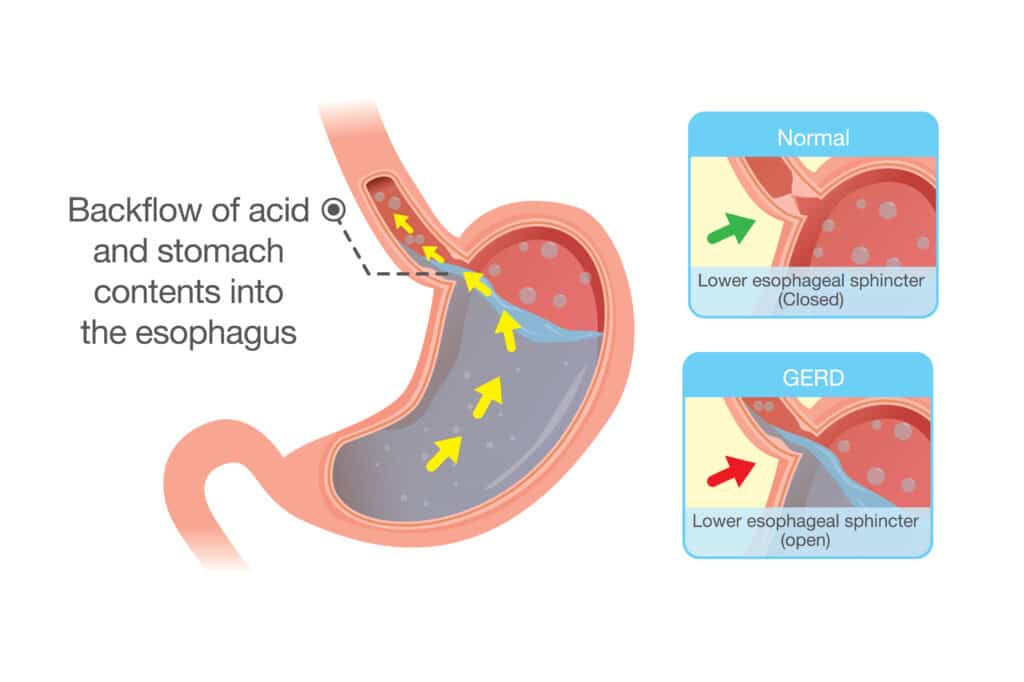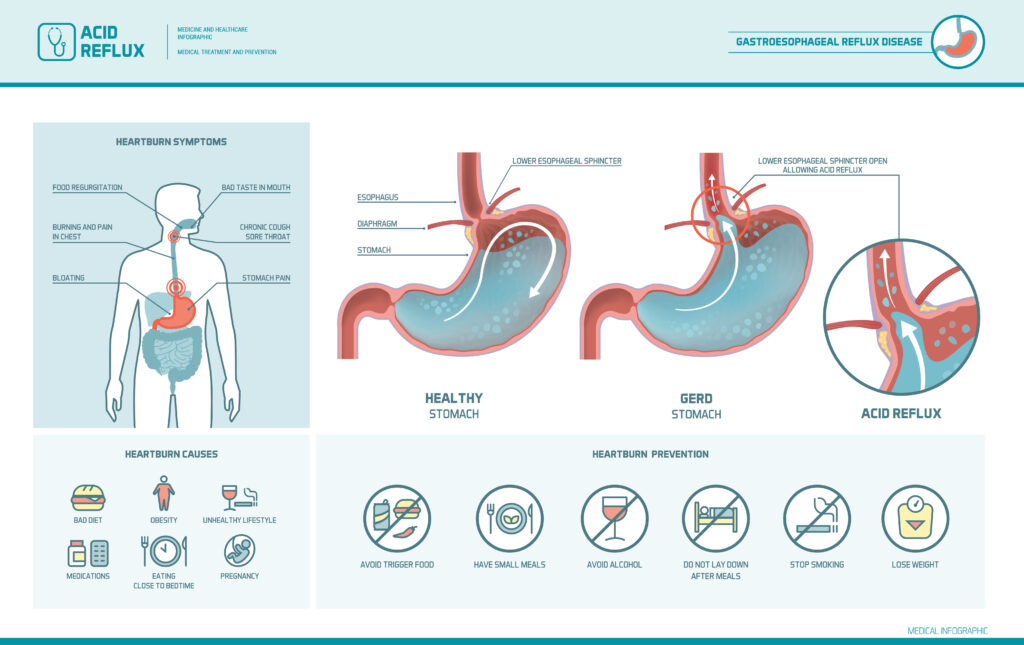
Apple cider vinegar has gained popularity as a natural remedy for various health conditions, including acid reflux and heartburn. Acid reflux or heartburn, also known as gastroesophageal reflux disease (GERD), occurs when stomach acid flows back into the esophagus, causing heartburn and other uncomfortable symptoms. Some people claim that drinking apple cider vinegar can alleviate these symptoms by balancing the stomach’s pH levels.
Although many individuals have reported relief from acid reflux symptoms after using apple cider vinegar, it is important to note that there is currently insufficient scientific evidence to support these claims. Despite the lack of concrete evidence, some people still choose to try this home remedy to relieve acid reflux itself, typically by diluting apple cider vinegar in warm water and consuming it before or after a meal. However, caution should be exercised as undiluted apple cider vinegar can erode tooth enamel and cause other side effects.
Understanding Acid Reflux (Heartburn)

Acid reflux, also known as heartburn, occurs when stomach acid flows back into the esophagus, the tube connecting the mouth and stomach. This backward flow can cause irritation, inflammation, and discomfort in the esophagus.
Causes and Symptoms
The most common cause of acid reflux is a weak or improperly functioning lower esophageal sphincter (LES). The LES is a muscle at the bottom of the esophagus that acts as a one-way valve, allowing food and liquid to pass into the stomach while preventing stomach acid from flowing back into the esophagus. When the LES does not close properly or becomes weakened, stomach acid can flow back into the esophagus, causing the following symptoms:
Heartburn: A burning sensation in the chest or throat
Regurgitation: A sour or bitter-tasting acid backing up into the throat or mouth
Bloating and belching
Difficulty swallowing
Hoarseness or a sore throat
Risk Factors and Complications
Some factors can increase the risk of developing acid reflux, including:
Obesity
Hiatal hernia
Pregnancy
Smoking
Consuming large meals or lying down right after eating
Drinking certain beverages, like alcohol, carbonated drinks, coffee or tea
Consuming specific foods, such as fatty or fried foods, citrus fruits, tomatoes, and chocolate
Medications such as calcium channel blockers, sedatives, or antidepressants
If left untreated, chronic acid reflux can lead to complications, including:
Esophagitis: Inflammation and irritation of the esophageal tissues
Esophageal ulcers: Painful sores developing in the lining of the esophagus
Strictures: Narrowing of the esophagus making it difficult to swallow
Barrett’s esophagus: A pre-cancerous condition, which can increase the risk of esophageal cancer
Using Apple Cider Vinegar for Acid Reflux (Heartburn)
How It Works

Does Apple Cider Vinegar help with heartburn? Apple cider vinegar is believed to help alleviate acid reflux symptoms by balancing the stomach’s pH levels. It is thought that the acetic acid in apple cider vinegar helps neutralize stomach acid, thus providing relief from acid reflux and heartburn symptoms. However, scientific evidence supporting this claim is limited, and further research is needed to confirm the efficacy of the acetic acid in this home remedy.
Benefits and Limitations
Some individuals report experiencing relief from acid reflux symptoms after using apple cider vinegar, which may suggest that it works for certain people. However, the effectiveness of this remedy varies from person to person, and there is no guarantee it will work for everyone. Additionally, there are currently no scientific studies that conclusively support the use of apple cider vinegar for acid reflux.
Recommended Dosage and Frequency: How to take Apple Cider Vinegar for Acid Reflux
If you want to try using raw apple cider vinegar yourself as a remedy for acid reflux, it is recommended to dilute it with water. As a general guideline, add two tablespoons to one teaspoon of apple cider vinegar to a mug of warm water, and drink it either before or after a meal. However, ensure you do not drink apple cider vinegar straight, as it can erode your tooth enamel and cause further issues.
It is essential to be cautious when using apple cider vinegar for acid reflux, as taking too much vinegar can potentially worsen symptoms. Therefore, it is best to start straight apple cider vinegar with a small dosage and monitor your body’s response.
Possible Side Effects: Can Apple Cider Vinegar make your Acid Reflux worse?
While apple cider vinegar has been reported to provide relief for some individuals with acid reflux, there are potential side effects to be aware of. For instance, undiluted apple cider vinegar can cause tooth enamel erosion, throat irritation, and even digestive discomfort. Furthermore, it can interact with certain medications, so it is crucial to consult with a healthcare professional before using apple cider vinegar as a remedy for acid reflux.
Lifestyle Changes to Manage Acid Reflux

Implementing a healthy diet lifestyle and other lifestyle changes can be an effective way to manage acid reflux symptoms. In this section, we will discuss dietary modifications, stress management and exercise, as well as sleep and posture adjustments.
Dietary Modifications
Making certain dietary modifications can help reduce the frequency and severity of acid reflux episodes. Some suggestions to improve acid reflux, include:
Avoiding trigger foods such as coffee, chocolate, alcohol, fatty foods, tomato, spicy foods, and acidic items
Eating smaller, more frequent meals instead of large meals
Waiting at least two hours after eating before lying down or going to bed
Stress Management and Exercise
Stress can contribute to acid reflux and other symptoms, so it is essential to develop techniques to manage stress. Some options to consider are:
Practicing relaxation techniques, such as deep breathing or meditation
Incorporating regular exercise into your routine, ideally low-impact activities like walking, swimming, or yoga
Considering seeing a therapist or counselor to discuss stress-management strategies
Sleep and Posture Adjustments
Adjusting your sleep and posture habits can also help alleviate acid reflux symptoms. Some recommendations include:
Elevating the head of your bed by at least six inches, using blocks or a wedge pillow, to help prevent stomach acid from flowing back into the esophagus
Trying to sleep on your left side, which can promote better digestion and decrease the likelihood of acid reflux
Maintaining good posture throughout the day, especially when eating, to reduce pressure on the stomach and esophagus
Medications for Acid Reflux
Over-the-counter (OTC) Medications for Acid Reflux
OTC medications are commonly used for treating mild to moderate cases of acid reflux. They consist of antacids, H2 receptor blockers, and proton pump inhibitors (PPIs). Antacids, such as Gaviscon (aluminum hydroxide magnesium) and Pepto Bismol (bismuth subsalicylate), work by neutralizing stomach acid, providing short-term relief for acid reflux symptoms.
H2 receptor blockers, like Pepcid AC (famotidine) and Tagamet (cimetidine), work to prevent and treat acid reflux, by blocking the receptors in the stomach that release acid, reducing stomach acid production.
Prescription Medications for Acid Reflux
Prescription medications for acid reflux are usually recommended when OTC medications are not effective to prevent reflux or for cases of severe acid reflux. These medications also include H2 receptor blockers and proton pump inhibitors, often at higher strengths than their OTC counterparts.
Proton pump inhibitors, such as omeprazole, lansoprazole, and esomeprazole, work by reducing the production of stomach to control acid reflux, thereby providing longer-lasting relief. It is crucial, however, to consult with a healthcare professional before starting any prescription medications for acid reflux.
When to Consult a Medical Professional
Although apple cider vinegar is considered a home remedy for acid reflux, its effectiveness is not proven and could interact with medications, such as diuretics and insulin. It is essential to consult a medical professional before using apple cider vinegar to treat acid reflux, especially if you are taking medications or supplements.
While some people may find relief temporarily through taking apple cider vinegar alone, it doesn’t address the underlying cause of acid reflux. If you experience persistent symptoms, seek medical advice to identify the root cause and receive proper treatment. Signs that you should consult a healthcare provider include:
Frequent heartburn or acid reflux symptoms
Difficulty swallowing
Experiencing nausea or vomiting
Unintentional weight loss
Persistent cough or sore throat
When consulting a medical professional, be sure to disclose your use of apple cider vinegar and any other home remedies or dietary changes you have implemented. This information will help your healthcare provider better determine the best course of treatment to address your specific needs.
Conclusion

In summary, apple cider vinegar may provide some relief for certain individuals experiencing GERD symptoms, such as heartburn, indigestion, and acid reflux. Some studies, like the one conducted at Arizona State University, suggest that organic apple cider vinegar appears to alleviate heartburn symptoms for some.
However, it is important to note that individual responses to apple cider vinegar may vary, and more extensive research is needed to establish its overall effectiveness in treating acid reflux symptoms. Make sure to consult with a healthcare professional before using apple cider vinegar as a treatment, as it might not be suitable for everyone.
As a natural remedy, drinking apple cider vinegar also has its share of potential health benefits too, but one should always approach it with caution and consideration for their personal health needs. Remember that there is no one-size-fits-all solution to health issues, and what works for some may not work for others.



